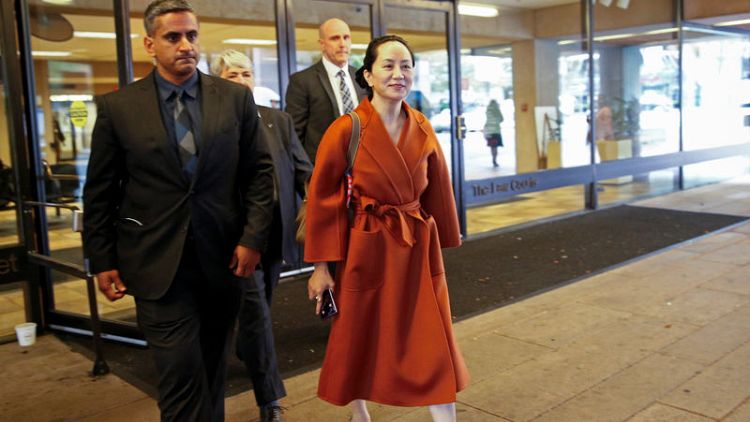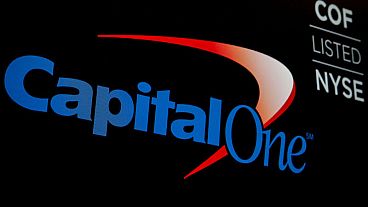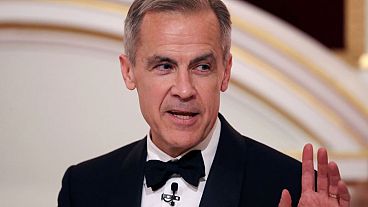By Karen Freifeld
VANCOUVER (Reuters) - There is no evidence Canadian border officials or police acted improperly when Huawei Chief Financial Officer Meng Wanzhou was detained and arrested at Vancouver's airport nearly 10 months ago, the attorney general of Canada said in a filing released on Monday.
The filing was made public as Meng and her lawyers were in British Columbia Supreme Court in Vancouver arguing for additional disclosure surrounding the arrest, including contacts between U.S. and Canadian authorities. The defence claims Meng was unlawfully searched and questioned under the ruse of an immigration check and is seeking a halt to extradition proceedings.
Meng, 47, was detained at Vancouver's airport on Dec. 1 at the request of the United States, where she is charged with bank fraud and accused of misleading HSBC Holdings Plc <HSBA.L> about Huawei Technologies Co Ltd's business in Iran. She has said she is innocent and is fighting extradition.
Her extradition hearing itself is not scheduled to start until January, but the two sides are already in court. The current hearing is scheduled to end on Wednesday and resume on Sept 30 for another five days.
"There is no evidence that the conduct of officials, either Canadian or foreign, has compromised the fairness of the extradition proceedings," Canada's attorney general said in the filing.
"No purpose would be served in providing further disclosure." The attorney general said the defence had already been provided with extensive disclosure, and that Meng's lawyers have failed to show her claims could justify halting extradition proceedings.
The arrest has strained China's relations with both the United States and Canada. Shortly after her arrest, Beijing detained Michael Kovrig, a former diplomat, and Michael Spavor, a businessman, and later, charged them with espionage. China also blocked imports of Canadian canola seed and meat.
At Monday's hearing before Justice Heather Holmes of the British Columbia Supreme Court Meng lawyer Richard Peck said, the Canadian border agency and police delayed implementing Meng's rights, and gave the border agency an opportunity to interrogate her, with plans to share the information with the Canadian police and the Federal Bureau of Investigation (FBI).
"We refer to this as a 'covert criminal investigation' under the pretext of an admissibility examination for immigration purposes," Peck said.
BURNT ORANGE COAT
The attorney general of Canada said in its filing that the border officers acted pursuant to "lawful authority to determine whether the applicant and her goods were admissible to Canada."
The government said there's no legal reason an arrest warrant must be executed before a person goes through immigration and customs, and that there was nothing wrong with border agency and foreign law enforcement officials sharing information about people who may be of interest to the agency.
Meng arrived at the Vancouver court on Monday in a burnt orange coat, an electronic monitor on her left ankle above silver glittering shoes. She sat in the well of the courtroom next to an interpreter, wearing a long purple dress and with her hair pulled back with a black velvet bow.
Meng's lawyers have said in court papers that she was unlawfully detained, searched and questioned for over three hours after she landed on a flight from Hong Kong. Under the ruse of an immigration check, they claim Canadian officials collected evidence for U.S. authorities.
Extradition proceedings against Meng should be halted if officials abused the process, the lawyers say. Besides accusations of misconduct related to her detention, they argue the United States is using Meng for economic and political gain, noting that after her arrest, U.S. President Donald Trump said he would intervene if it would help close a trade deal.
Vancouver lawyer Gary Botting, who has seen a video of Meng being detained at the airport, said immigration officials came across as "Keystone Cops."
"There are real questions about whether her rights were violated," said Botting, who briefed Meng's defence team on Canada's extradition law after her arrest but is no longer involved with the case.
Meng, the daughter of Huawei founder Ren Zhengfei, spent 10 days in jail in December but was then released on C$10 million ($7.5 million) bail and is living in one of her two multimillion-dollar homes in Vancouver. She is required to wear an electronic ankle bracelet and pay for security guards.
Huawei, the world's largest telecommunications equipment maker, has been accused by the United States of activities contrary to national security or foreign policy interests. Huawei denies those charges.
U.S. and Chinese officials resumed trade talks last week, as the world’s two largest economies try to negotiate a way out of their 14-month trade war.
(Reporting by Karen Freifeld; Writing by Denny Thomas; Editing by Tom Brown and Lisa Shumaker)



